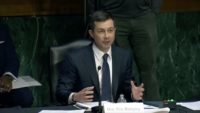On the eve of the second, and final, public hearing on the Trump administration’s proposed rewrite of rules implementing the National Environmental Policy Act (NEPA), advocates and critics of the plan held dueling press conferences that underscored their sharply differing views about the proposal.
Further steps in the regulatory process are yet to come and environmental groups are expected to challenge the proposal in court. [View Jan. 9, 2020, ENR story on the proposed rule here.]
Proponents of the revised regulations—speaking at a Feb. 24 briefing at the U.S. Chamber of Commerce’s Washington, D.C., headquarters—argued strongly that plan would speed up approvals for important construction projects. [View White House fact sheet outlining the proposal here.]
Opponents of the proposal, in a conference call for reporters that began shortly after the advocates' briefing, blasted the plan as a rollback of a pillar of federal environmental protection. [View text of proposed regulations here.]
Among the provisions in the proposal, published in the Federal Register on Jan. 10, is a two-year limit for completing an environmental impact statement (EIS), the most rigorous type of project review. It applies to major projects that are judged to have a significant impact on the environment.
The proposal, issued by the White House Council on Environmental Quality, also would call for a one-year deadline for finishing an environmental assessment, a process in which a federal agency determines whether a project would have a significant environmental impact.
In addition, the plan would give contractors or project applicants a greater role in drawing up an EIS, though under an agency’s supervision.
Among the speakers at the U.S. Chamber's briefing were some from the construction industry. [View video of the U.S. Chamber briefing here.]
Terry O’Sulivan, general president of the Laborers' International Union of North America, said that because of lengthy environmental reviews, “Critical infrastructure projects are languishing for years and in some cases, decades.” He cited some examples, including a project at the Taos., N.M., airport, which underwent an environmental review that took about 20 years.
The CEQ said the average NEPA review for major projects is seven years.
O'Sullivan said the proposal “will help free up logjams” on projects.
Stephen Sandherr, Associated General Contractors of America's chief executive officer, said the administration's proposal "is an essential first step to providing the American people with cleaner water, safer roads and bridges and a more reliable energy system.
Sandherr said the plan would produce "equally rigorous, but far faster, project reviews" and that contractors would still have to comply with all key provisions of current environmental statutes.
Dave Bauer, American Road & Transportation Builders Association CEO, called the proposal "a common-sense continuation of the long-term effort to deliver needed transportation projects for America."
Bauer noted that the five-year highway reauthorization bill that the Senate Environment and Public Works Committee cleared unanimously in July includes the "One Federal Decision" plan contained in a 2017 Trump executive order.
That plan, which calls for one agency to be designed the lead entity in a project review, to help avoid evaluations by multiple agencies. Bauer said the single-agency provision is also part of the CEQ's NEPA rule revisions.
Sen. Tom Carper (Del.), the top Democrat on the Environment and Public Works Committee, told reporters on the conference call that the proposal “gives the fox keys to the hen house, by allowing…companies to write their own environmental impact statements and creates loopholes to avoid environmental review and public input.” [Hear audio recording of conference call for reporters here.]
Carper contended that the public "is largely being left out" of the process for developing the proposed regulations.He criticized CEQ for holding just two hearings on the proposal, for what he termed “sort of the bedrock law for environmental protection in our country."
The senator said he would be among those speaking at the Feb. 25 CEQ hearing, but said he only was allotted three minutes to speak. The council had a hearing on Feb. 11 in Denver.
Carper also said that he and other congressional Democrats would fight the NEPA revisions.
Dinah Bear, former general counsel of the CEQ under Democratic and Republican administrations, said on the call that the proposal “would strip away NEPA’s protections for citizens, tribes and local and state government." Bear also said it would eliminate current requirements to consider a project's indirect and cumulative impacts, including climate change.



Post a comment to this article
Report Abusive Comment